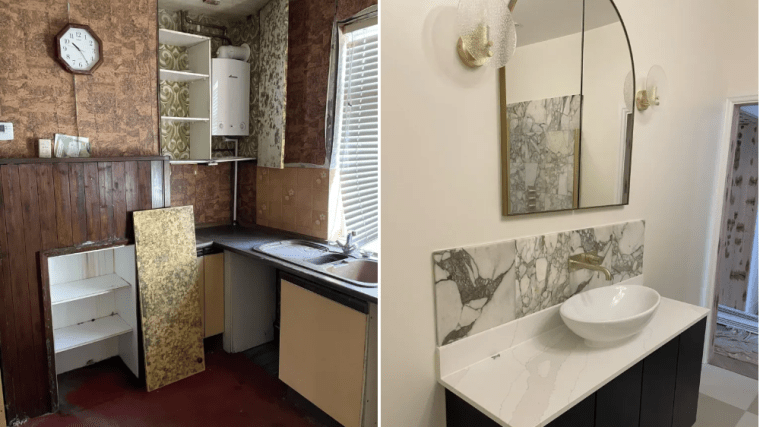Kamilah Hale, 36, wanted to buy a bungalow for years – a property that would make living with a disability easier – yet struggled to find many on the market.
The few that were available were snapped up quickly or out of her price zone – a problem that is becoming increasingly common.
Recent data from estate agents Hamptons shows that bungalow prices have continued to rise with the average price now at £386,201.
Separate data from the National House-Building Council (NHBC) shows bungalows were on the “critically endangered” list, comprising only one per cent of new-builds in 2024, compared to 11 per cent in 1990.
It added the number of bungalows being built had slumped to an 80-year low yet demand remains high.
Paula Higgins, chief executive of HomeOwners Alliance, said: “There is a huge demand for bungalows but hardly any get built anymore.”
For Ms Hale, she needed a bungalow as it makes life easier with her disability.
“I finally bought an extremely rundown bungalow last September but it took years of finding one.
“I’ve been living in a ground floor flat for 7 years but I wanted somewhere with a private garden and without people living above me.”
Ms Hale, the founder of Wordier, an educational publisher, eventually managed to buy a bungalow in Bromley but it took months of renovations that cost £85,000 in total. This included adding a heat pump, underfloor heating and solar panels.
“There was a leak that wasn’t dealt with for a year before I bought it – as a result of it being a probate sale – so the ceilings were bowing and floorboards were rotting by the time I moved in.”
However, it did mean she got a discount of around £160,000 on the property, paying £592,000 in total.

She said: “The layout suits me and my mobility needs. I think it is going to make a huge difference to my mental health and quality of life.”
Aneisha Beveridge, head of research at Hamptons, said: “Bungalow prices have continued to edge upwards, rising 3.5 per cent year-on-year and outperforming the wider market.
“Traditionally favoured by older downsizers, bungalows are now catching the eye of younger buyers too – thanks to their generous plots and potential to extend in the future. That growing appeal across age groups is adding to competition and driving values higher.”
Older people unable to downsize due to bungalow shortage
A shortage of bungalows is preventing a growing number of older homeowners from moving with more than 1.2m homeowners aged 55 or over shelving plans to move in the past two years, according to HomeOwners Alliance.
Around 34 per cent of 2,000 people surveyed in this age category said a shortage of suitable homes was the main reason they put their plans to move on hold.
Specifically, the shortage of bungalows being listed or built was a “major issue” deterring people aged 55 or over from moving, the findings added.
Read Next: I’m 54 and will use my pension lump sum to pay off my mortgage. Is it a good plan?
Findings published by developer McCarthy Stone earlier this year claimed more than 9m older people, or 72 per cent, wanted more retirement bungalows to be built. The housebuilder estimated that there were approximately 2.5m bungalows across the UK.
A dearth of bungalows being built or listed has implications for buyers of all age groups, as it, in some cases, prevents would-be downsizers from taking the plunge and moving to a smaller and more manageable property.
As of 22 September, there were just 252 bungalows listed for sale on Rightmove’s online property portal in London.
A lack of supply but high demand is pushing up prices with over 35 listed with an asking price of £1m or more.
Zoopla said one in five bungalows for sale on its site were in the south east.
The challenges of building more bungalows
Part of the reason that fewer bungalows are being built is because many housebuilders view them as an inefficient use of space and costly to build.
Builders typically want to maximise the space on each building plot, favouring properties with more storeys.
James Shaw, director of buying agency Prime Purchase, said: “When it comes to building new bungalows, the problem is that we are a small island with limited land and property prices are so expensive that if you can get two storeys and double the square footage by going up, then developers will.”
Mr Shaw recently experienced the challenge of finding a suitable bungalow for clients.
“I recently had some American clients moving to the UK who wanted a bungalow. We looked at a couple – 4,000 square foot-plus, so perhaps not your average bungalow – but it was very tricky finding the quality they wanted as the old 1960s-style bungalows just didn’t cut it. Ultimately, they ended up buying a house.”
Another issue that Mr Shaw flagged was that when bungalows are listed, some are in a poor condition.
He said: “They may require extensive renovation to make them more suitable to modern-day living, which may put off some buyers in this current climate when it’s hard to get builders and the cost can be prohibitive.”
John Tonkiss, chief executive at McCarthy Stone, said: “Increasing bungalow supply along with other forms of housing for older people must be a priority for Government to stem years of declining provision, particularly as ministers are currently reviewing national planning policy.
“As well as helping keep older people independent for longer, it would reduce pressures on the NHS and release larger family-sized homes that younger people could move into.”





